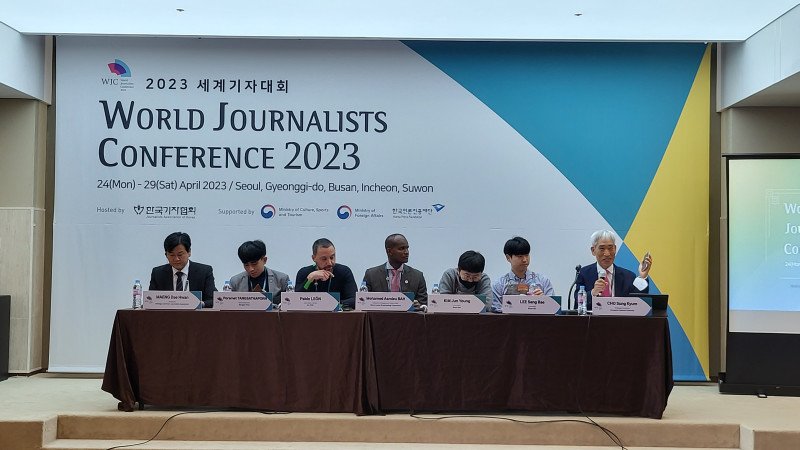South Korea (Brussels Morning Newspaper), Local newsrooms across the world are facing a double threat. Local journalism, an essential tool in sustaining local democracy and accountability, has been struggling for years to maintain its audience faced with a challenging media landscape and developing trends in social media.
Rapidly declining advertising revenues are further centralising reporting, sidelining local interest stories and shifting resources towards large media giants. At the same time, the advent of social media has popularised alternative forms of sharing information. This has led to a significant increase in misinformation and targeted harassment.
At the 2023 World Journalists Conference in Seoul, Korea on 25 April, journalists from across the world gathered to discuss means with which to keep local reporting alive in spite of the significant threats. Irrespective of the reporting region, the problems facing small newsrooms are largely the same, but the proposed remedies varied greatly.

Journalists from Korea, Sierra Leone, Spain, and Thailand, all agree on one thing. Media funding is one of the most pressing issues facing local publications. In the US alone, more than a quarter of newspapers have been forced to shut down in the last 15 years.
Local journalism under threat
A 2020 report published by the Hussman School of Journalism and Media paints a bleak outlook for local journalism. Without new funding for local publications, large news deserts risk dying up information about rural and underrepresented areas.
The Covid-19 pandemic has only accelerated this trend. In 2018-2020, 300 US newspapers closed, 6,000 journalists lost their jobs, and print media circulation declined by 5 million. All the while, media consolidation in the world’s second largest democracy increased, surviving through mergers and forming media “mega chains.”
The same trend can be observed in the UK. Local media revenues dropped by 70% in 2010 and 2020, according to the Department for Digital, Culture, Media and Sport. As a result of this difficult funding, more than 320 local outlets closed in 2009-2019. More than two-thirds of UK publications are owned by the three largest publishers.
Even in the most far-flung media markets, a similar decline has been observed. Mohamed Bah, Director of Media and Public Affairs at the Sierra Leone Broadcasting Corporation (SLBC) says that local media suffers from critical underfunding.
“Sierra Leonean media, like many in the developing world, share similar challenges which range from political interference by the powers that be to the dwindling of funds in advertising and the big elephant in the room– social media– which is almost making the role of journalists useless in some parts of my country,” Bah said.
Indeed, many local newspapers, as well as radio and television stations have been forced to close their doors due to declining investment and advertising revenues. At the same time, social media has led to a rampant rise in misinformation within Sierra Leone, according to the Centre for Democracy and Development (CDD).
Solutions-based journalism
While local journalism is often considered archaic in an age of civilian journalism and social media, some argue that a robust local media can act as a counterbalance to increasingly pervasive social media coverage
Pablo Léon, journalist at Spanish newspaper El País, argues that local press is an important tool in the fight against misinformation. “Local, close, and useful journalism is a good antidote to viral lies,” he told participants at the WJC2023. “There are many local stories whose impact is global… They are glocal news.”

With the right funding and resources, the capacity for local news stories to have a national developmental effect is evident. In Europe, organisations such as the Journalism fund and the European Commission provide valuable grants to help sustain quality regional development journalism.
One of the winners of the 2023 Pulitzer Prize for Local Reporting was a local corruption investigation. The result of the article, published by Mississippi Today, was the discovery and dismantling of a web of corruption involving state funds, and an investigation into a national celebrity.
Solutions-based local reporting has the capability to effectively communicate the concerns of local citizens, hold local officials accountable, and bring national attention to local issues.
“The approach that local journalism should take is to ‘provide constructive criticism for the region and offer to solve the problem together,” believes Dae Hwan Maeng, President of the Gwangju-Jeonnam Journalists Association in South Korea.
“Major Korean newspapers with large circulation mostly allocate only one page to local news… this central-biased approach is highly disproportionate. In contrast, local newspapers focus the majority of their articles on pressing issues within their region,” the Korean journalist said.
Maeng is confident that quality reporting, especially based on solutions-based journalism that addresses issues relevant to local residents, can still attract paying subscribers and regional significance. “Despite many local newspapers struggling with financial losses, they are undoubtedly an essential social tool for promoting regional co-prosperity,” he asserted.
Innovative approaches
While local journalism is in crisis, this does not mean that is the wrong time to experiment. Novel approaches, often called “new journalism”, can provide exciting opportunities to expand local journalism to younger audiences, who are often underrepresented in reader figures.
At the conference, Busan-based journalists Jun Yong Kim and Sang Bae Lee offered a glimpse of what the future of vibrant local journalism may be.

Their award-winning project, the Sanbok Laundry, opened a free-to-use laundromat in a deprived area of their city. Washing the clothes of local residents free of charge, the two journalists embedded themselves into the local community, listening to the stories of older residents.
Not only did the laundromat benefit the local community, the newspaper gained a popular insight into an array of human interest and solutions-based stories. This project helped their newspaper, Busan Ilbo, to create relevant print and multimedia content for the local community.
“We devised an idea to directly enter the community without waving our press passes or cameras,” said Kim. “They [the residents] gladly supported our ‘greater purpose’ of listening to the stories.”
The two journalists said that they received positive feedback, both from the local residents and readers, who praised the “creative” approach to gathering information. In its 2022 report, the International Press Institute advocates for new ways of thinking to reach audiences and create interesting stories.
“Successful local media engage their audiences in the acts of research and writing, reaching out to them for information, commentary, and analysis,” their Local Media Survival Guide notes. The IPI also suggests “embedding” into local communities to overcome boundaries of trust, political interests, and disinformation.
Even in restrictive media landscapes, this tacting of embedding appears to hold true. Poramet Tangsathaporn, news reporter at the Bangkok Post, said that despite censorship and government pressure on media outlets, capturing local voices remains important. However, in order to facilitate this, some local newsrooms in non-free countries require the support of international organisations.
“It is necessary to create a network among journalists or news agencies across the nation, region, or between countries,” Tangsathaporn believes. “Organising cross media training by major news agencies can really help local news agencies to work professionally.”




